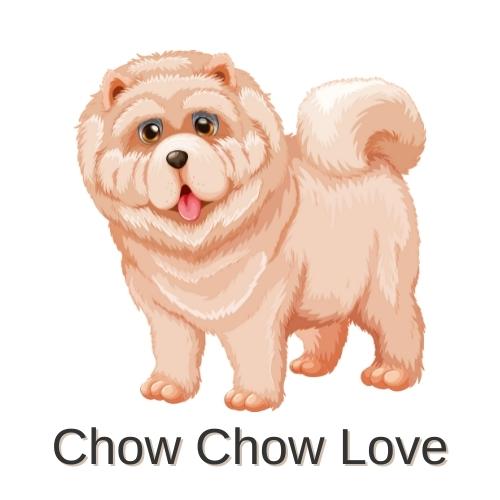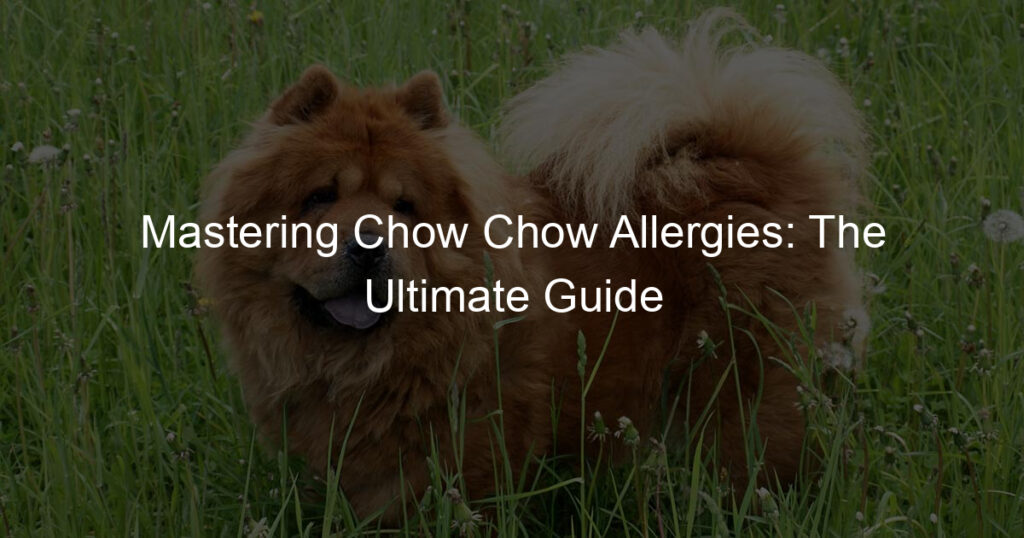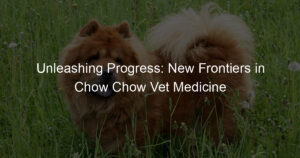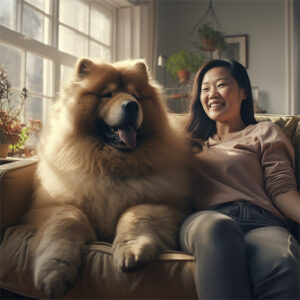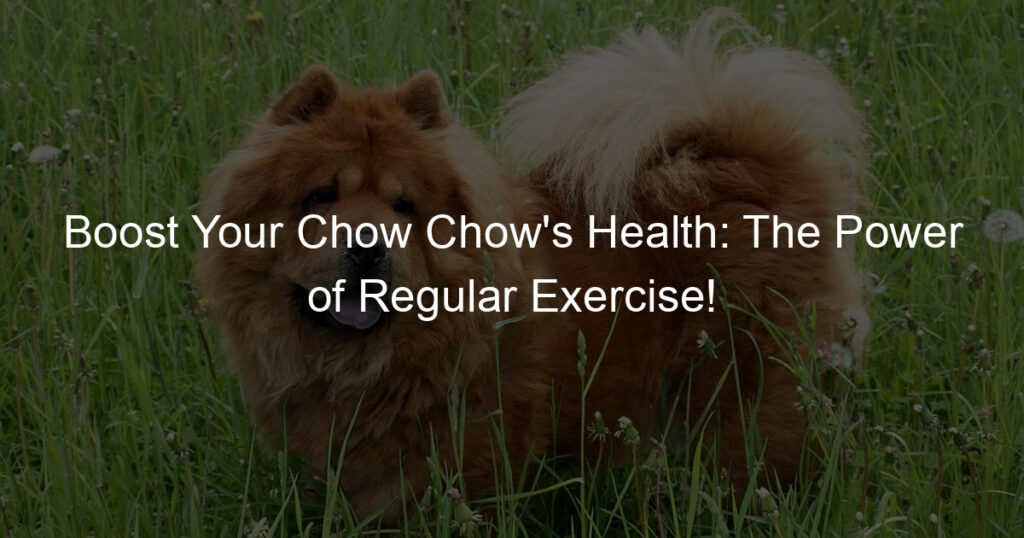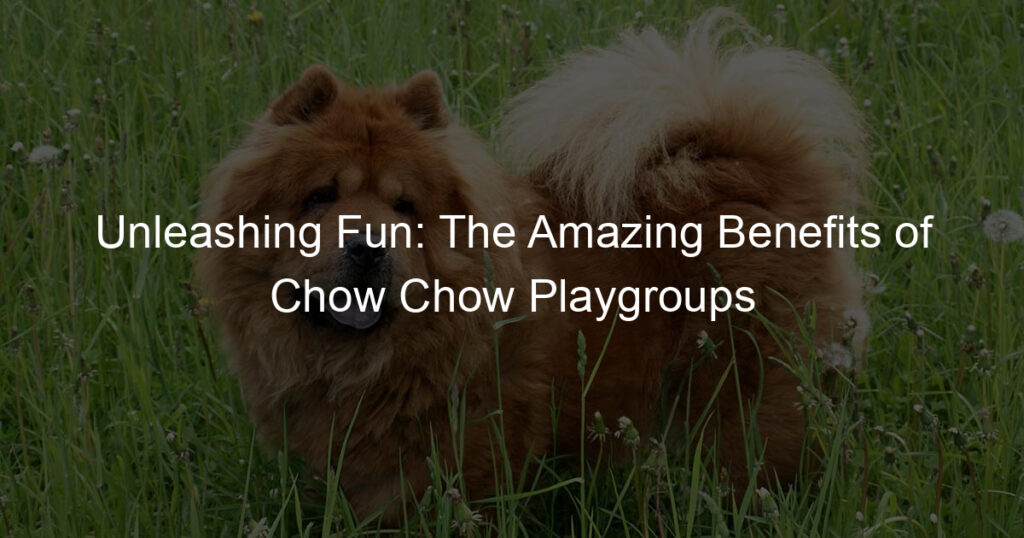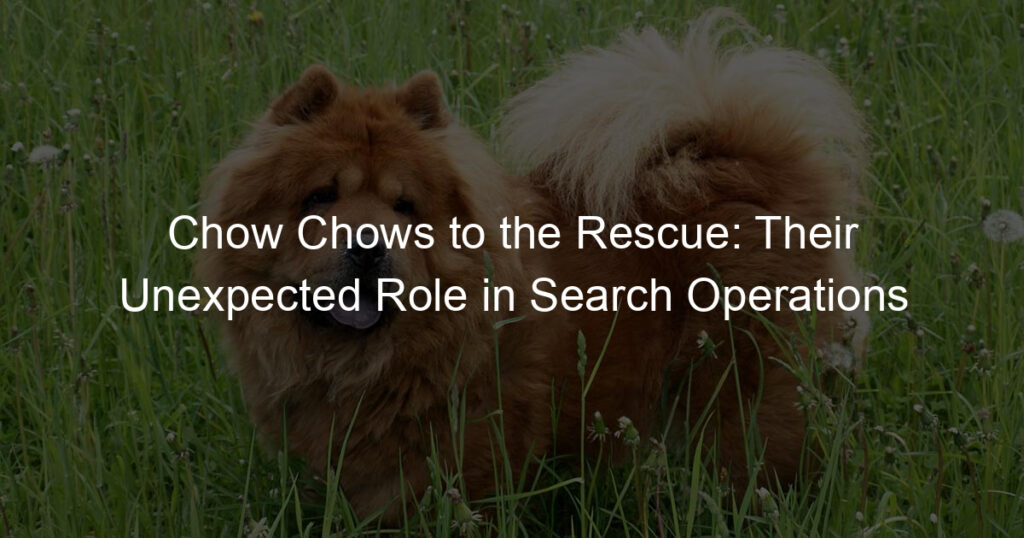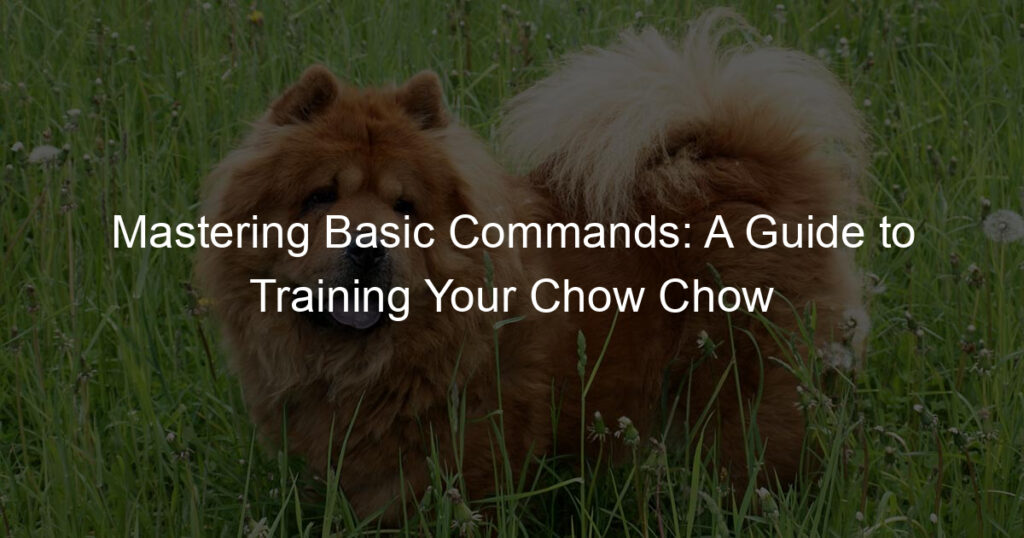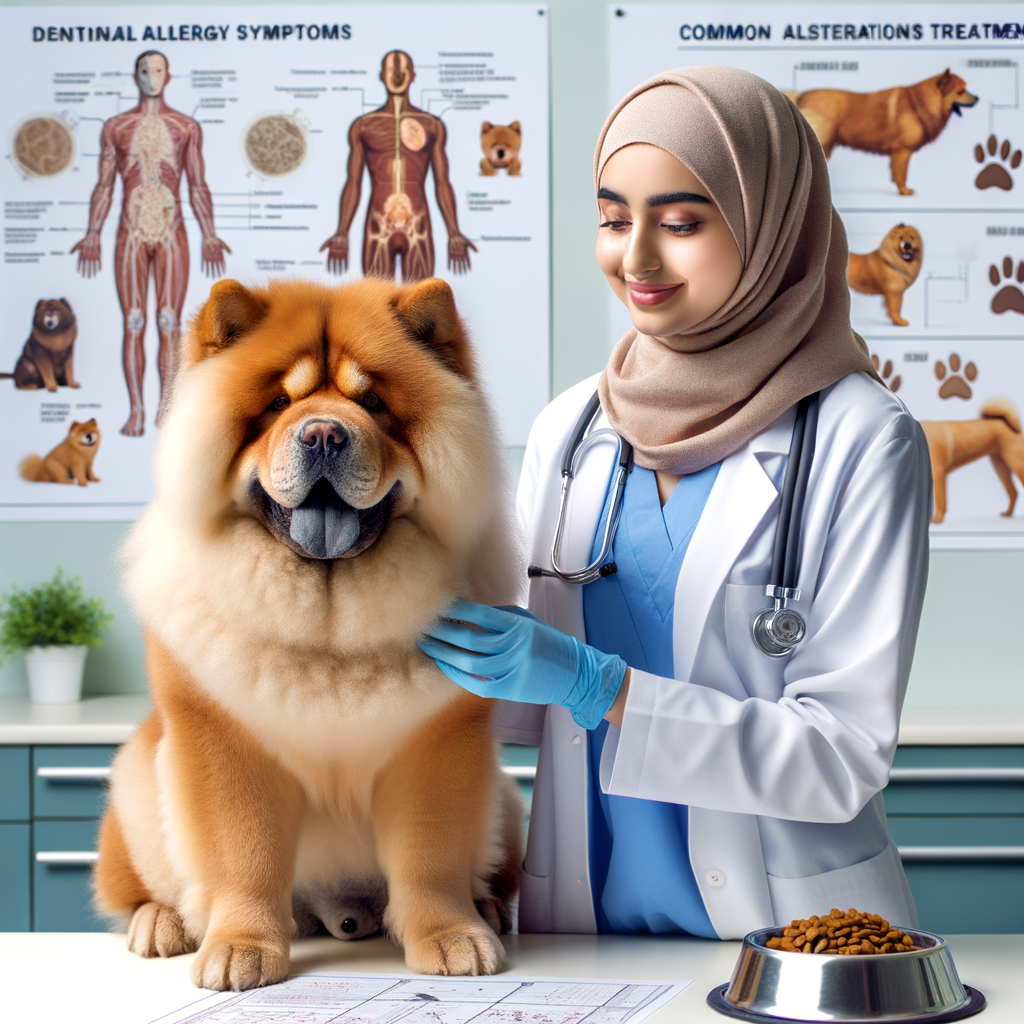
Introduction to Chow Chow Allergies
Chow Chows are a unique breed of dogs known for their lion-like appearance and aloof demeanor. However, like all breeds, they are susceptible to certain health issues, including allergies. In this section, we will delve into the world of Chow Chow allergies, helping you understand the basics and common causes.
Allergies in Chow Chows, as with other breeds, occur when their immune system overreacts to substances or particles that are usually harmless. These substances, known as allergens, can be found in various sources such as food, the environment, or even on the skin of the dogs themselves. When a Chow Chow is exposed to an allergen, their body responds by releasing histamines, which cause the symptoms of an allergic reaction.
There are several common causes of allergies in Chow Chows. These include:
-
- Food Allergies: Certain Chow Chows may be allergic to specific ingredients in their food. Common culprits include beef, chicken, corn, wheat, and soy.
- Environmental Allergies: These are caused by allergens in the environment, such as pollen, dust mites, and mold spores. These allergies are often seasonal and can cause symptoms like itching and sneezing.
- Flea Allergy Dermatitis: This is a reaction to flea saliva and can cause severe itching and skin inflammation in Chow Chows.
Understanding the basics and common causes of Chow Chow allergies is the first step in managing these conditions. In the following sections, we will explore how to recognize symptoms, understand food sensitivities, and navigate treatments for Chow Chow allergies.
Recognizing Chow Chow Allergy Symptoms
Recognizing the symptoms of allergies in your Chow Chow is the first step towards ensuring their health and happiness. Let’s dive into the physical symptoms you should keep an eye out for.
Physical Symptoms
Physical symptoms are often the most noticeable signs of allergies in Chow Chows. Here are some key signs to watch out for:
-
- Signs of skin allergies in Chow Chows
Chow Chows with skin allergies often display symptoms such as redness, itching, and swelling. They may also have patches of hair loss and their skin may feel warm to the touch. You might notice your Chow Chow scratching or licking excessively, especially around their paws, belly, and ears. These are all signs that your Chow Chow could be dealing with a skin allergy.
-
- Identifying respiratory symptoms
Respiratory symptoms can also be a sign of allergies in Chow Chows. If your Chow Chow is sneezing, coughing, or has a runny nose or eyes, they may be experiencing an allergic reaction. It’s important to note that these symptoms can also be signs of other health issues, so it’s always best to consult with a vet if you notice any changes in your Chow Chow’s breathing or overall health.
Remember, every Chow Chow is unique and may display different symptoms. Always consult with a professional if you suspect your pet may be suffering from allergies.
Behavioral Symptoms
When it comes to recognizing Chow Chow allergy symptoms, it’s important to understand that they’re not always physical. Allergies can also cause significant changes in your Chow Chow’s behavior. Let’s explore these behavioral symptoms in more detail.
-
- Changes in behavior due to allergies
Allergies can make your Chow Chow feel uncomfortable, leading to noticeable changes in their behavior. They may become more irritable, less active, or show signs of distress such as excessive licking or scratching. It’s important to observe your pet closely and note any unusual behavior. Remember, these changes may be subtle, so it’s crucial to be attentive.
-
- How allergies can affect a Chow Chow’s temperament
Allergies can also affect your Chow Chow’s temperament. If your dog is constantly dealing with itchy skin or other discomforts due to allergies, they may become more agitated or anxious. This can lead to a change in their overall temperament, making them less playful and more withdrawn. It’s essential to understand that these changes in temperament are not your dog’s fault. They are simply reacting to the discomfort caused by their allergies.
In conclusion, behavioral changes in your Chow Chow could be a sign of allergies. It’s important to keep a close eye on your pet and consult with a veterinarian if you notice any changes in their behavior or temperament. Remember, early detection and treatment of allergies can significantly improve your Chow Chow’s quality of life.
Understanding Chow Chow Food Sensitivities
Food sensitivities in Chow Chows can be quite common, and it’s essential to understand them to ensure your pet’s health and happiness. In this section, we will discuss the common food allergens for Chow Chows and how to identify a food sensitivity.
- Common food allergens for Chow Chows
Chow Chows, like many other breeds, can be sensitive to certain types of food. Some of the most common food allergens for Chow Chows include:
- Grains, especially wheat and corn
- Dairy products
- Chicken
- Beef
- Soy
It’s important to note that every Chow Chow is unique, and what causes a reaction in one dog may not cause a reaction in another. Therefore, it’s crucial to monitor your Chow Chow’s reaction to different foods and consult with a veterinarian if you notice any adverse reactions.
- How to identify a food sensitivity
Identifying a food sensitivity in your Chow Chow can be tricky, but there are a few signs you can look out for. These include:
- Excessive scratching or licking
- Red, inflamed skin
- Chronic ear infections
- Vomiting or diarrhea
- Loss of appetite
If you notice any of these symptoms, it’s important to consult with a veterinarian. They can help determine if your Chow Chow has a food sensitivity and guide you on the best course of action.
In conclusion, understanding Chow Chow food sensitivities is crucial for your pet’s overall health. By being aware of common allergens and knowing how to identify a food sensitivity, you can ensure your Chow Chow lives a happy, healthy life.
Guide to Chow Chow Allergy Treatments
If your Chow Chow is suffering from allergies, it’s important to know that there are several treatment options available. Let’s explore the medical treatments that can help your furry friend feel better.
Medical Treatments
Medical treatments for Chow Chow allergies can be divided into two main categories: over-the-counter options and prescription treatments. Both have their own advantages and are effective in different situations.
-
- Over-the-counter options
These are treatments that you can buy without a prescription from your vet. They are usually used for mild to moderate allergies. Some of the most common over-the-counter treatments include antihistamines, which can help to reduce itching and inflammation, and topical creams, which can soothe irritated skin. Remember, it’s always best to consult with your vet before starting any new medication for your Chow Chow.
-
- Prescription treatments
For more severe allergies, your vet may recommend prescription treatments. These could include stronger antihistamines, corticosteroids to reduce inflammation, or even immunotherapy, which involves giving your dog small amounts of the allergen to help their body build up a tolerance. These treatments are usually more effective but may also have more side effects, so it’s important to discuss the pros and cons with your vet.
Remember, every Chow Chow is unique and what works for one may not work for another. It’s important to work closely with your vet to find the best treatment plan for your dog’s specific needs.
Natural Remedies
While medical treatments are often necessary, there are also natural remedies that can help manage your Chow Chow’s allergies. These remedies can be a great supplement to medical treatments, or a good option for dogs who can’t tolerate certain medications. Let’s explore some of these options.
-
- Home remedies for Chow Chow allergies
There are several home remedies that can help soothe your Chow Chow’s allergy symptoms. Here are a few you might want to try:
-
-
- Coconut Oil: This can be added to your dog’s food or applied directly to the skin. It has anti-inflammatory properties that can help reduce itching and swelling.
- Oatmeal Baths: Oatmeal has natural soothing properties that can help relieve itching and discomfort. Make sure to use plain, unscented oatmeal and mix it with warm water to create a bath for your dog.
- Probiotics: These can help balance your dog’s gut health, which can in turn improve their immune system and reduce allergic reactions.
- Benefits of natural treatments
-
Natural treatments can offer several benefits for your Chow Chow:
-
- Less Side Effects: Natural remedies often have fewer side effects than medications, which can be particularly beneficial for dogs with sensitive stomachs or other health issues.
- Cost-Effective: Many natural remedies, like coconut oil or oatmeal, are inexpensive and readily available.
- Improved Overall Health: Many natural remedies not only help with allergies, but can also improve your dog’s overall health and wellbeing.
Remember, it’s always important to consult with your vet before starting any new treatment for your dog’s allergies. While natural remedies can be very helpful, they should not replace professional veterinary care.
Managing Chow Chow Allergies
Managing allergies in your Chow Chow can be a challenging task. However, with the right preventive measures and an allergy-friendly environment, you can significantly reduce the frequency and severity of your pet’s allergic reactions.
- Preventive measures for Chow Chow allergies
Prevention is always better than cure. This saying holds true for managing allergies in your Chow Chow. Here are some preventive measures you can take:
- Regular grooming: Regularly grooming your Chow Chow can help remove allergens from their fur. This includes brushing their coat daily and bathing them every 4-6 weeks with a hypoallergenic shampoo.
- Healthy diet: A balanced diet can boost your dog’s immune system, making them less prone to allergies. Avoid foods that are known to cause allergies in dogs, such as wheat, soy, and certain types of meat.
- Regular vet check-ups: Regular visits to the vet can help detect allergies early and prevent them from getting worse. Your vet can also provide advice on how to manage your dog’s allergies.
- Creating an allergy-friendly environment for your Chow Chow
Creating an allergy-friendly environment for your Chow Chow is another crucial step in managing their allergies. Here are some tips:
- Keep your home clean: Regularly clean your home to remove allergens. This includes vacuuming carpets, washing bedding, and cleaning surfaces.
- Use air purifiers: Air purifiers can help remove allergens from the air, reducing your dog’s exposure to them.
- Avoid using chemical cleaners: Chemical cleaners can irritate your dog’s skin and cause allergic reactions. Use natural, non-toxic cleaners instead.
Remember, managing allergies in your Chow Chow requires patience and consistency. With the right preventive measures and an allergy-friendly environment, you can help your pet live a happy and healthy life.
Chow Chow Breed Allergies: Case Studies
Let’s dive into some real-life examples of Chow Chows dealing with allergies. These case studies will provide valuable insights into how these issues can be managed effectively.
- Case study 1: Overcoming food sensitivities
Meet Bella, a three-year-old Chow Chow who had been suffering from chronic digestive issues. Her owners noticed she often had loose stools and seemed lethargic after meals. They decided to consult with a veterinarian who suspected a food sensitivity.
After conducting an elimination diet, it was discovered that Bella was sensitive to chicken and grains. Her diet was then adjusted to include novel proteins like venison and sweet potato. The result was a significant improvement in Bella’s digestive health. She became more energetic and her stools returned to normal.
This case highlights the importance of identifying food sensitivities in Chow Chows. It also shows how a simple change in diet can make a huge difference in a dog’s quality of life.
- Case study 2: Managing skin allergies
Next, let’s look at Max, a two-year-old Chow Chow who was constantly scratching and biting his skin. His owners noticed red, inflamed patches on his skin and knew something was wrong. They sought help from a veterinarian who diagnosed Max with atopic dermatitis, a common skin allergy in dogs.
Max’s treatment plan included regular baths with a hypoallergenic shampoo and a topical cream to soothe his skin. His owners also started giving him an omega-3 supplement to help improve his skin health. Over time, Max’s skin condition improved and he was no longer constantly itching.
This case study demonstrates that skin allergies in Chow Chows can be managed with the right treatment plan. It also emphasizes the importance of seeking professional help when your dog shows signs of discomfort.
These case studies show that with proper care and attention, Chow Chows can lead happy and healthy lives despite their allergies. Remember, early detection and intervention are key in managing allergies in your Chow Chow.
Key Takeaways: Mastering Chow Chow Allergies
As we wrap up our comprehensive guide on Chow Chow allergies, let’s summarize the most important points. These key takeaways will help you understand, detect, and manage your Chow Chow’s allergies effectively.
- Understanding is the first step: The first step in mastering Chow Chow allergies is understanding them. Allergies in Chow Chows can be caused by a variety of factors, including food, environmental allergens, and even certain materials. Recognizing the signs of allergies, such as excessive scratching, redness, or digestive issues, is crucial.
- Importance of early detection and treatment: Early detection and treatment of allergies can prevent complications and improve your Chow Chow’s quality of life. Regular check-ups with your vet can help detect allergies before they become severe. Treatment options can range from dietary changes to medication, depending on the cause of the allergy.
- Managing allergies for a happier, healthier Chow Chow: Managing your Chow Chow’s allergies is an ongoing process. This might involve regular vet visits, changes to diet or environment, and possibly medication. With proper management, your Chow Chow can lead a happy and healthy life, despite their allergies.
Remember, every Chow Chow is unique, and what works for one might not work for another. It’s important to work closely with your vet to find the best solution for your furry friend. With knowledge and understanding, you can help your Chow Chow navigate their allergies and enjoy a happy, healthy life.
